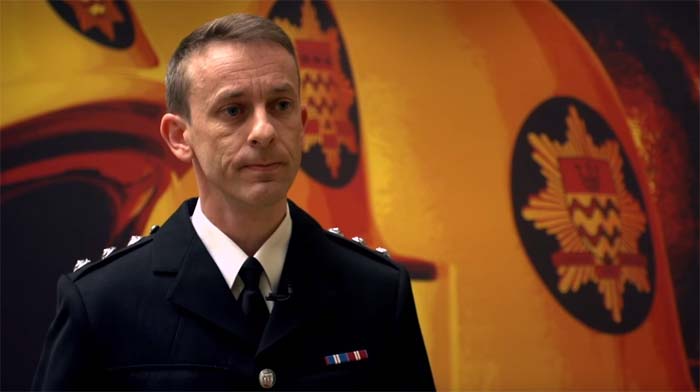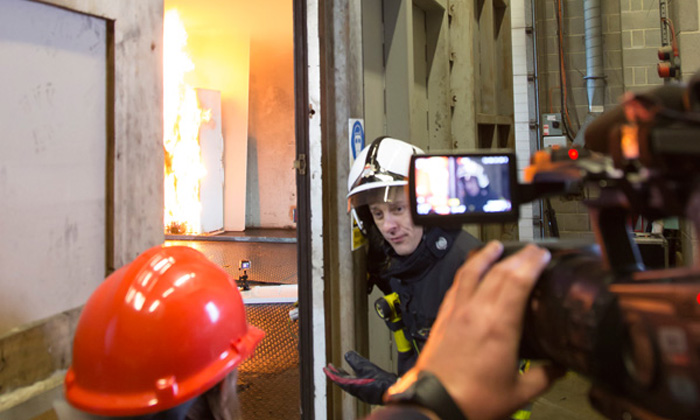While we will always respond to fires and other emergencies, our work has changed to include a greater emphasis on fire prevention and community safety and our Head of Fire Investigation, Charlie Pugsley, leads a team that seems more CSI than LFB.
Established in 1972 with the specialist team starting in 1984, as one of the first teams of its kind in the UK, our Fire Investigation Team attends approximately 1,700 fires a year and is one of the busiest teams in the country.
The team of 22 is based at Dowgate Fire Station and although they don’t ride to investigation scenes using a fire engine, they are all still experienced and fully trained firefighters.
"It is our job to provide an explanation about what happened and why, as well as to investigate what changes can be implemented to avoid similar fires in the future," said Charlie.
Charlie joined London Fire Brigade in 1996 as a firefighter before moving into the Fire Investigation Team in 2004 and later, in 2010, moved into management.
Charlie added: "The Fire Investigation Team don't have an agenda and we aren’t here to apportion blame to anyone.
"We are here to independently prove facts and provide evidence that will, ultimately, lead to making people safer."
The evidence provided by Charlie and his team has already had a significant impact on people’s everyday lives.
'Tenacity is vital'
In the last couple of years’ the Brigade has been involved in campaigning for new regulations for safer fuse boards and fridge freezer manufacturers to improve the safety standards of their designs.
"We want to change the standard internationally for how fridge freezers are manufactured.
"Our recommendations have been accepted in the UK but narrowly missed out on international acceptance.
"It is disappointing but we will try again," said Charlie.

It is this persistent character trait that he thinks is vital for working in fire investigation.
"Tenacity is vital for working in fire investigation. It isn’t a nine-to-five job. Our staff will regularly be off duty and notice something that may be a little suspect on sale in a shop and decided to investigate it a little further."
Although some fridge freezer manufacturers have indirectly changed their designs as a result of the team's work, it is social media where their conclusions have drawn some of the more visible impacts on people's lives.
'Set fire to a lot of stuff'
The teams work on identifying a Nutella jar, a crystal door knob and fake mobile phone chargers as causes of fire led to thousands of people tweeting and posting on Facebook about how they had changed their behaviour.
"Five to ten years ago there wasn’t anywhere near as much technology available as we have today.
"Now we have smart phones and tablets, among other things, and they are increasingly made from plastics which can be highly flammable and are reliant on lithium batteries which when they fail, can be highly dangerous," said Charlie.

The team has staff sitting on committees of the British Standards Institution, which ensures the Brigade has a voice at discussions on the future of white goods and electrical items such as e-cigarettes and solar panels.
By Charlie's own admission they "set fire to a lot of stuff to see what happens to it" but all with the goal of helping make the world a safer place for the public and firefighters.
"Our work helps toward preventing future fires but also feeds into all aspects of the Brigade itself.
"Our findings have helped steer fire safety messaging – like the mirrors or glass objects on windowsills warning – as well as operational changes.
"We are constantly looking at our way of working and how we can provide further value for money while increasing public safety.
"While other services might have a fire investigation team, it's our focus on public and consumer safety issues that makes us one of the leading fire investigation teams in the world."
Smallest, largest and strangest fires
Proof that fires come in all sizes, Charlie admits the smallest fire he has ever attended began after a lithium battery "malfunctioned and caused a fire" inside the push button of a doorbell.
At the other end of the scale, Charlie was on the scene of a fire attended by 30 fire engines, at a five-storey timber frame building in Camberwell.
"We had to sift through 80 dustbins worth of debris, by hand, to look for clues as to how the fire had started," said Charlie.
"People often have the idea that fire investigation is like the CSI programmes on TV.
"However, the reality in this case was a long and painstaking process: sifting the layers of burnt debris, trying to find the tiny remains of electrical cables or components of a cigarette lighter.
"Each time we found a vital clue that would help lead us towards the cause, it was extremely rewarding"
Among the strangest fires Charlie has attended include a roll of wet toilet paper being dried by using a microwave and a dog that jumped up and turned on the hobs of a cooker, causing a kitchen fire.